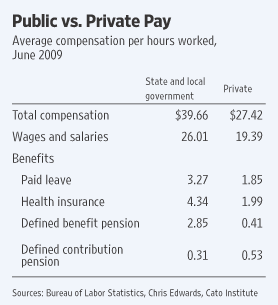youbet
Give me a museum and I'll fill it. (Picasso) Give me a forum ...
We've had many discussions on this board concerning the fairness, viability and survivability of various pensions, especially public pensions. I've been following the situation in Illinois where the state budget is in shambles, tax increases are on the drawing board and some people (not necessarily me) consider some aspects of public pensions excessively generous/expensive.
I now see that the Legislature has passed HB1946, sponsored by Rep. Bob Fidler (D) and sent it to the governor's desk for signature. I noticed the bill makes these significant changes:
Raises the full retirement age to 67 or an early, reduced pension at 62, either with 10 yrs service.
Pensions will be calculated on the basis of the final 8 yrs of service, increased from 4 yrs. (This will make spiking more expensive for the various employer agencies.)
No double dipping. (Continuing to work for the gov't while collecting a gov't pension.)
Caps the highest salary a pension can be calculated on at the SS earnings cap.
Only people hired on or after 1 Jan 2011 are affected.
And, amazingly, the legislature also passed HB6368 to make similar reforms to pensions for General Assembly members and judges. That is...... what they did unto others, they also did to themselves!
Will this be isolated to Illinois? Might similar changes occur in other states impacting the future retirements of youngsters entering the state labor forces in the future?
http://news.mywebpal.com/news_tool_v2.cfm?show=localnews&pnpID=469&NewsID=977067&CategoryID=7026&on=1
Mods: I hope this doesn't belong in the political section as it's intended as a continuation of the discussions of DBP's and FIRE. But feel free to move if necessary.
I now see that the Legislature has passed HB1946, sponsored by Rep. Bob Fidler (D) and sent it to the governor's desk for signature. I noticed the bill makes these significant changes:
Raises the full retirement age to 67 or an early, reduced pension at 62, either with 10 yrs service.
Pensions will be calculated on the basis of the final 8 yrs of service, increased from 4 yrs. (This will make spiking more expensive for the various employer agencies.)
No double dipping. (Continuing to work for the gov't while collecting a gov't pension.)
Caps the highest salary a pension can be calculated on at the SS earnings cap.
Only people hired on or after 1 Jan 2011 are affected.
And, amazingly, the legislature also passed HB6368 to make similar reforms to pensions for General Assembly members and judges. That is...... what they did unto others, they also did to themselves!
Will this be isolated to Illinois? Might similar changes occur in other states impacting the future retirements of youngsters entering the state labor forces in the future?
http://news.mywebpal.com/news_tool_v2.cfm?show=localnews&pnpID=469&NewsID=977067&CategoryID=7026&on=1
Mods: I hope this doesn't belong in the political section as it's intended as a continuation of the discussions of DBP's and FIRE. But feel free to move if necessary.

